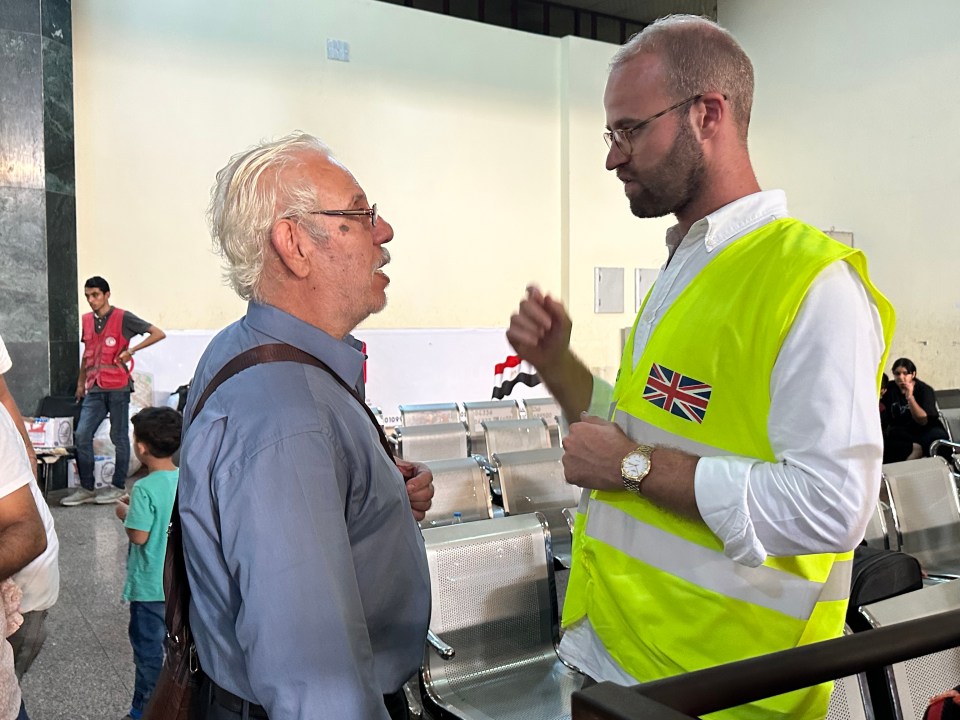DOZENS more Brits finally made it out of besieged Gaza yesterday — crossing over the Rafah border into the safety of Egypt.
Families spoke of their intense relief after 90 of their loved ones escaped the enclave while the week-long Israeli bombardment continued.
A Brit official speaks to a recent arrival at Rafah crossing on the border of Gaza and Egypt as dozens of UK citizens make it out of the StripEPA
This included Elizabeth and Maged El-Nakla, from Dundee, whose son-in-law Humza Yousaf is First Minister of ScotlandFamily Handout / PA Wire
Among those who made it were the in-laws of Scotland’s First Minister Humza Yousaf, who said: “These last four weeks have been a living nightmare.”
He confirmed at noon that his wife Nadia’s parents, Elizabeth and Maged El-Nakla, from Dundee, were out as he told of his “deep personal relief”.
Of 200 or so Brits stuck in Gaza when war broke out, a handful are thought to remain in northern Gaza because it has been impossible to travel safely south to Rafah.
The Foreign Office has not said exactly how many have made it out.
Security Minister Tom Tugendhat said the Government was being “very cautious” on numbers.
He said: “We neither control the border, nor do we control what’s going on inside Gaza.
“We don’t want to give false hope or false belief to individuals that they’ll be able to cross.”
The UK has deployed a Border Force team in Cairo and posted consular officials near Rafah to assist those trying to get out.
Among those to cross at Rafah was surgeon Abdel Hammad, from Liverpool.
His son, Salim, said: “We finally got the news when he gave us a call and said, ‘I’ve made it through’. We felt overriding relief.”
Scottish leader Mr Yousaf and his wife called for a ceasefire so a humanitarian corridor could open to save innocent Palestinians as Israel continues its rout of Hamas.
He said: “Although we feel a sense of deep personal relief, we are heartbroken at the continued suffering of the people of Gaza.
“We reiterate our calls for all sides to agree to an immediate ceasefire, the opening of a humanitarian corridor and for all hostages to be released.”
As the fighting raged, US Secretary of State Antony Blinken urged both sides to do as much as possible to reduce casualties.
On his third visit to Israel since the conflict began, he described Hamas’s bloodthirsty outrages on October 7 as “almost beyond human capacity” and blasted them for using civilians as “human shields”.
More than 1,400 people were slaughtered in the attacks.
Mr Blinken, who met Israeli PM Benjamin Netanyahu, also said more needed to be done to protect Palestinian civilians in Gaza.
He said: “We have provided Israel advice, that only the best of friends can offer, on how to minimise civilian deaths while still achieving its objectives of finding and finishing Hamas terrorists.”
And he said work on a two-state solution — with Israel and Palestine peacefully co-existing beside each other — must begin “not tomorrow, not after today, but today”.
Mr Netanyahu ruled out a temporary ceasefire to establish a humanitarian corridor unless the kidnapped Israelis were released.
Four of the 242 abducted have been allowed to leave and one was rescued.
America is flying MQ-9 Reaper drones over Gaza to help locate the others.
Israeli Defence Forces troops, meanwhile, have tightened their encirclement of Gaza City.
Hamas health chiefs said more than 9,000 Palestinians have been killed.
There were reports of 15 deaths when a convoy of ambulances carrying injured Palestinians to the Rafah crossing was hit.
An IDF spokesman said later: “An IDF aircraft struck an ambulance that was identified by forces as being used by a Hamas terrorist cell in close proximity to their position in the battle zone.
“A number of Hamas terrorist operatives were killed in the strike.
“We have information which demonstrates Hamas’s method of operation is to transfer terror operatives and weapons in ambulances.
“We emphasize that this area is a battle zone. Civilians in the area are repeatedly called upon to evacuate.”
Another four Israeli soldiers have died, taking the total killed to more than 330 since the war began.
Violence also continues to escalate in the West Bank where the death toll since October 7 is 144.

